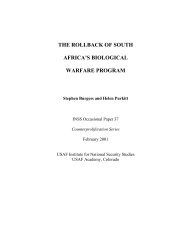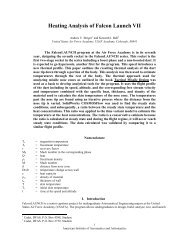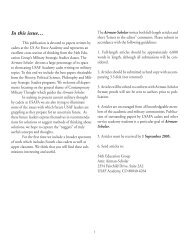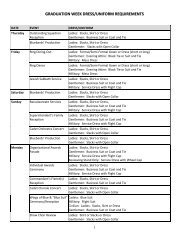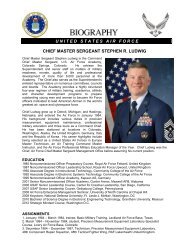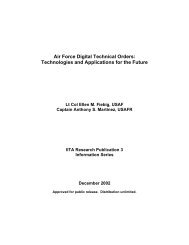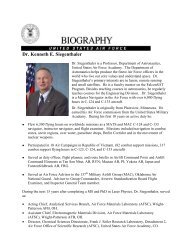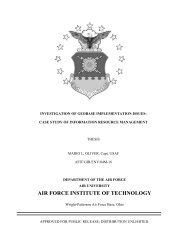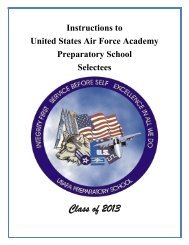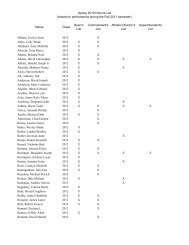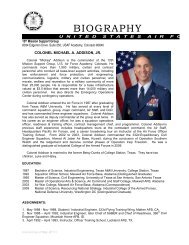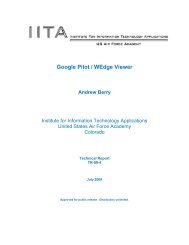Military Professionalism - United States Air Force Academy
Military Professionalism - United States Air Force Academy
Military Professionalism - United States Air Force Academy
Create successful ePaper yourself
Turn your PDF publications into a flip-book with our unique Google optimized e-Paper software.
Mullen, Michael G. and Robert M. Gates. Media Roundtable with Secretary of<br />
Defense Robert Gates and Chairman of the Joint Chiefs of Staff Adm. Michael<br />
Mullen from the Pentagon Briefing Room, Arlington, VA. Office of the Assistant<br />
Secretary of Defense, Public Affairs, Mar. 5, 2008.<br />
http://www.defense.gov/transcripts/transcript.aspx?transcriptid=4168<br />
The U.S. military is ready to accept whoever the American people elect as president to be<br />
the commander in chief, regardless of that person’s demographics. Civilian control of the<br />
military must be maintained. Retired officers are free to express their views and to align<br />
themselves with politicians. However, Adm. Mullen does worry that these views get<br />
construed as the beliefs of the military as a whole.<br />
Moten, Matthew. “Strengthening the Political-<strong>Military</strong> Relationship.” Foreign<br />
Affairs 89.5 (Sept./Oct. 2010): 2-8.<br />
Retired flag officers have the right to endorse political candidates. In the 2008 election,<br />
more than a hundred retired officers publicly endorsed one candidate. This gave the new<br />
president reason to be suspicious of the political loyalties of the armed forces. The<br />
military must maintain an apolitical stance and accept civilian control.<br />
“Retired Diplomats, Soldiers Fault U.S. Policy.” The St. Petersburg Times (Jun. 14,<br />
2004): 3A.<br />
A group of 26 retired diplomats and military officers urged Americans to vote President<br />
Bush out of office in the elections. The group stated that they had lost confidence in the<br />
ability of the Bush administration to advocate for American interests or to provide the<br />
necessary leadership. They did not explicitly endorse John Kerry.<br />
Running for a political office after retirement<br />
Cohen, Eliot A. “General Malaise.” The Wall Street Journal (Eastern Edition) (Aug.<br />
4, 2004), A.12.<br />
Out of a 1.4 million-person military, the U.S. has fewer than a thousand generals and<br />
admirals on active duty; it is an elite group of men and women who have risen to the top<br />
of a remarkably meritocratic system. Once they retire they deserve, and usually receive,<br />
a degree of deference and opportunity unmatched by those in other professions. When<br />
the country is at war, they get a respectful hearing on strategy and tactics. Informally<br />
they exert a great deal of influence on today's military, filled as it is with their former<br />
subordinates and protégés. They appear prominently in the web of consultancies,<br />
advisory panels, Congressional hearings, and defense contractors that makes up the<br />
informal defense establishment. They carry weight because of their experience, and the<br />
expectation that they speak with the voice of disinterested patriotism. Molded by a<br />
67




